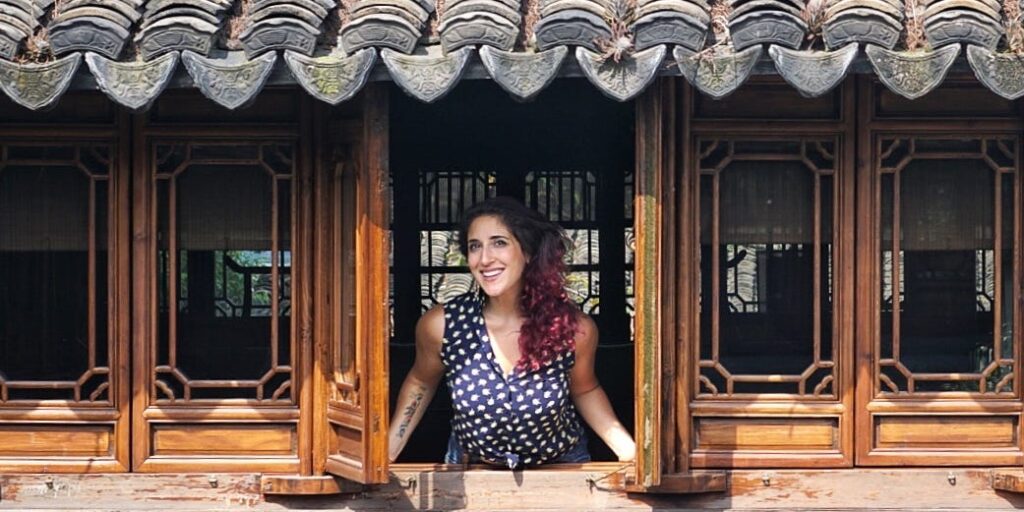I touched down in Shanghai from Chicago in 2015, armed with a year-and-a-half work contract, an overstuffed suitcase, and 20 more boxes en route. It was not the most conventional way to arrive in a country I’d never set foot in.
But after stints in Israel and Argentina, I saw myself as a “global citizen,” convinced I’d settle in within weeks. Spoiler: I was wildly overconfident.
The lesson came swiftly: China does not bend its will. Instead, one learns to adapt, to alter one’s rhythm to the customs of this vast nation. I’ve found that the answer to most questions is merely, “because China.”
We moved into a high-rise complex “maze” in Shanghai, which has a population equivalent to that of my husband’s hometown. As the years passed, I learned to expect boiling tea at restaurants even during sweltering months, and stopped being shocked when every face wash included skin-whitening ingredients.
The mantra was used during many moments of frustration as I attempted to navigate this foreign culture.
Culture shock, both ways
During my first few years in China, I lived for those rare moments when a local would compliment my minimal but slowly improving Chinese. Yet, it was more common for children to point at me and shout: “Look, mom, a laowai!” A foreigner.
No matter how many Chinese landmarks I visited, soap operas I watched, pop culture references I learned, or hours I spent practicing writing Chinese characters, I would forever be a laowai.
Sophie Steiner
On a recent trip back to my hometown in the US, I took part in one of my favorite end-of-summer pilgrimages: the Minnesota State Fair — an annual ritual for every ever-affable Midwesterner, myself included — filled with carnival parade antics, agricultural exhibits, fireworks, and, most importantly, the overconsumption of all things sugared, battered, and fried.
I weaved through the rows of American flags, snapping photos. The unfamiliarity felt similar to what I felt during my first year in China, — mouth agape with reverse culture shock. I didn’t fit in anymore with my football-throwing, beer-chugging, farm-friendly kin.
Yet again, I found myself a foreigner, but this time in a familiar land.
Friends feel like foreigners
My definition of home has evolved over the years, and my everyday practices have changed alongside it.
From perpetually drinking hot water to cure any ailment to relying on Traditional Chinese Medicine — like acupuncture and Chinese herbs — rather than Western remedies, my values and beliefs have shifted in ways I never anticipated.
I will never fully belong in Chinese culture, just as I will never quite fit into the mold of my American upbringing either.
This sense of alienation is a common theme for many expatriates. It’s a bittersweet realization: the more you adapt to a new culture, the more you risk losing touch with your roots.
By living abroad, I’ve traded the dream of a house with 2.4 kids and a white picket fence for the freedom to microdose retirement — traveling on a whim to far-flung islands across Asia.
As the world becomes increasingly multicultural, feelings of dislocation and juxtaposing belonging often resonate. While I am technically not a “third culture kid” — a term coined by sociologist Ruth Hill Useem referring to those who spend their formative years outside their parents’ home country, resulting in a lack of belonging in both places — I find myself a “third culture adult.”
I blend elements of my American upbringing with experiences gained in China, forming a distinctly fluid identity that doesn’t quite fit into traditional categories.
I struggle to relate to friends and family back home — they don’t understand my yearning to hike the upper reaches of the Tibetan Autonomous Region or my fixation on black sesame desserts. It all sounds foreign to them, just as their experiences of refurbishing their bathroom for the umpteenth time feel foreign to me.
Sophie Steiner
My search for belonging
Now, I have learned to embrace the “China moments” that arise with a sense of humor and humility.
During my early years in China, being called laowai was a marker of my otherness. Now, I wear it as a badge of honor, evidence of my journey and growth.
As I look ahead, I recognize that my path is not just about navigating the complexities of being a foreigner in another country but also about reconciling that identity with my origins. Perhaps I’m not meant to belong entirely anywhere but instead to find solace in the spaces between cultures.
I embrace my life in Shanghai and the challenges that come with it.
Do you have a story to share about relocating to a city in Asia? Contact the editor at akarplus@businessinsider.com.


